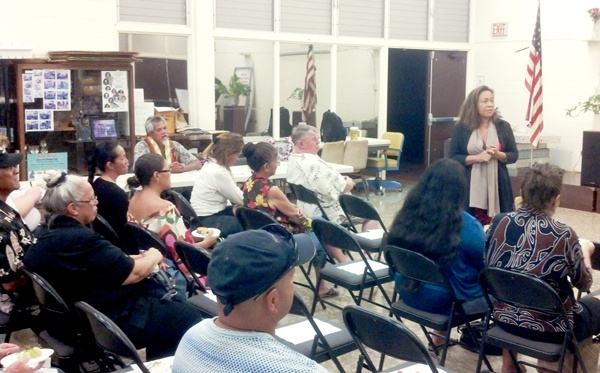WAIMEA — The Office of Hawaiian Affairs candidates met with voters one final time last week before Election Day. The event, held Friday night at the Waimea Neighborhood Center, drew a crowd of about 25 people from the Westside. Hosted
WAIMEA — The Office of Hawaiian Affairs candidates met with voters one final time last week before Election Day.
The event, held Friday night at the Waimea Neighborhood Center, drew a crowd of about 25 people from the Westside.
Hosted by the Kaua‘i Native Hawaiian Chamber of Commerce, the event featured eight of the 10 Office of Hawaiian Affairs (OHA) candidates.
In a place of honor among the candidates was a photo of Sharon Pomroy draped in a lei. Pomroy was an OHA candidate who collapsed after giving her speech at the first candidate forum and passed away several days later.
OHA Candidates Dan Ahuna and Kanani Kagawa Fu were not in attendance Friday night.
Each candidate was allowed three minutes to speak to the group.
The first candidate was Leland “Radar” Yadao.
“I often hear people quote our dear Liliu‘okalani and in the same breath support and ignore the overthrow legislation like Act 282 and Act 55. Make no mistake, we are officially under attack again. Act 282 has limited the definition of public land,” Yadao said.
Yadao also spoke out against Act 55 and the PLDC.
“The PLDC will not be good for business for Hawaiians or Hawai‘i residents. It will be good for businesses of the nations of the Asian Pacific Economic Corporation. Our land and resources are now their commodity,” Yadao said.
“Please ask these other candidates if they understand what is to be lost. If elected, I intend to use legal means, legislation and wisdom … to make sure our land remains under our control.”
Candidate Jackie Kahookele Burke intends to focus on unification, public health, energy and agriculture if elected.
“The road to self-governance is a silent road,” she said, “versus the Ku‘e Petition, which was heard on canoes, on mules, going door to door. … We can’t rely on government to make choices. It’s our own people making our own choices.”
Another platform Burke strongly supports is public health. She called for a dental program for all Native Hawaiians.
“Take care of our teeth. That’s really important to our health,” she said. “It can give us strokes, high blood pressure. There isn’t a plan out there. If all Native Hawaiians had their own dental plan, we’d be way ahead.”
Burke also called for Native Hawaiians to own public utilities and energy, adding, “What is a nation without energy?”
Candidate Liberta Hussey Albao started her speech by noting that she has studied genealogy for more than 25 years and has more than 300 relatives on Kaua‘i.
She is seeking commissary privileges for Native Hawaiians and helped secure 350 scholarships for charter schools in Hawai‘i.
“People on this side of the island, you have a gold mine,” Albao said of plans to install alternative energy sources on Hawaiian homelands across Kaua‘i. “We need to work on capacity building in the Hawaiian community.”
Candidate Kaliko Santos emphasized her work with OHA over the past 15 years and the need to listen to communities more to hear what they want.
“I’m such a passionate person on what the community has to say,” she said. “Listening has taught me so much. That’s why I’m running for OHA.”
Candidate Haunani Pacheco addressed the issues affecting agriculture on Kaua‘i, ranging from endangered species of birds eating 800,000 pounds of taro, to the fishing supply, which is in jeopardy as the islands look at turning areas into sanctuaries and limiting the ability of fishers to make their livelihood on the ocean.
“We’re advising the DLNR (Department of Land and Natural Resources) how to conserve,” Pacheco said, adding that as of now, Hawaiians face having, “no fish, no poi, no land.”
Candidate Keola Alalem Worthington says his strength is in translating deeds and documents into Hawaiian.
“I know the language, history and culture from translating documents,” he said. “Because of music and culture, Hawaiian people control the economy.”
Worthington spoke of his time living and promoting the Hawaiian culture worldwide doing promotions with the Polynesian Cultural Center and how new ideas are needed to “sustain our people.”
Candidate Billy Kealamaikahiki Swain was unable to attend, but sent his sister-in-law, Deb Swain, to represent him.
Swain said that as a business owner for 30 years, her brother-in-law looks to develop partnerships with OHA, the state, the county and Kamehameha Schools to buy Coco Palms and create a Hawaiian cultural and education center.
She noted that Billy would like to develop monetary incentives for graduates to help them graduate from college and go on to graduate school.
“These are our future Hawaiian leaders,” Swain said. “We need to foster an environment of success.”
Candidate Ronson Sahut wants to be proactive in trying to save Makaweli Poi, adding that “taro offers more than jobs. It’s a source of pride.”
In nothing that he descends from a long line of saltmakers, Sahut said he wants to work “to preserve and protect the salt patches in Hanapepe.”
He then called for OHA to invest more in people through education to stop homelessness, poverty and poor health.
“We need to honor our kupuna,” he said, “and help their voices be heard.”
An earlier version of this article misquoted Billy Kealamaikahiki Swain’s statement about high school graduates. Swain’s position is to work create scholarships and incentives for all students who wish to graduate from college and then go on to graduate degrees, not just those who graduated from Kamehameha Schools.


